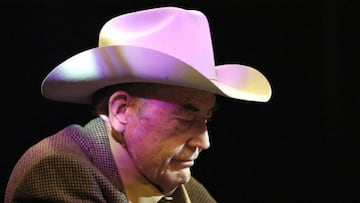The ‘Godfather’ of Poker has passed away. Who was Doyle Brunson?
The world of professional poker has lost a legends and with that, we’re taking a look at just who was the 10-time poker world champion, Doyle Brunson.


Known as ‘Texas Dolly,’ Brunson was an absolute giant on the poker scene and quite frankly the man who brought the game to the mainstream. With a career that goes back to the late 70s and stretched all the way to 2005, he will be missed by all.
Doyle Bruson has passed away.
According to a statement from his family which was shared by his agent on social media, Doyle Brunson, the “Godfather of Poker” himself passed away on Sunday in Las Vegas. Brunson was 89-years-old.
RIP To The Legend Doyle Brunson https://t.co/TjbYQORBLk pic.twitter.com/Yd7frLyYMO
— Barstool Sports (@barstoolsports) May 15, 2023
“It is with a heavy heart we announce the passing of our father, Doyle Brunson,” the statement read. “He was a beloved Christian man, husband, father and grandfather. We’ll have more to say over the coming days as we honor his legacy. Please keep Doyle and our family in your prayers. May he rest in peace.”
Looking back at Doyle Brunson’s career
Inducted into the Poker Hall of Fame inductee in 1988, Brunson won an incredible 10 World Series of Poker Tournaments - including back-to-back wins in the $10,000 no limit hold ‘em main events in 1976 and 1977. His first win in 1976 saw him take home $220,000 from a winner take-all field of 22 players. Then, in 1977 he pocketed a cool $340,000. Of course today’s WSOP sees an average of almost 9,000 entrants competing for more than $80 million in prize money, with the first-place player taking home $10 million.
The ‘Super System’ of Doyle Brunson
Perhaps one of the things that truly immortalized Brunson, was not just his play at the table, but rather what he had to say about it. Indeed, Brunson’s two books - “Super System” and it’s follow up ‘Super System 2′ are still considered to be some of the most influential books ever written about the game. Published in 1978, the 600-plus page “Super System” was groundbreaking in that it was one of the first books written by a poker professional in which readers could get an in-depth look into the game of Poker.
I woke up this morning to the sad news that Doyle Brunson passed away. From writing the single best poker book for anyone leaning the game - Super System - to winning back-to-back World Series of Poker with 10/2, the legend of the Texas Dolly will live on forever.
— Steve 🤙 (@NFTbark) May 15, 2023
🃏♠️♥️♣️♦️🃏 pic.twitter.com/IYwKnAum2Y
Though modern poker players now rely on high-powered computers to help them with analytics and strategy, it’s safe to say that the insights offered in Brunson’s two books form the foundation of any aspiring poker player’s approach to the game today. To that end, one can appreciate the words of one of Brunson’s longtime opponents at the table, Daniel Negreanu, who put things ever so simply on social media. “There will never be another Doyle Brunson,” he tweeted.
Doyle Brunson ushered in a new era for Poker
Related stories
As fans of Poker will likely know, prior to 2003′s WSOP the world of professional poker was really quite different. It was in that year when an accountant from Tennessee by the name of Chris Moneymaker won the main event where he defeated the experienced professional Sammy Farha to claim a $2.5 million top prize. As one can imagine, seeing an amateur poker player win such a prestigious tournament and moreover have it broadcasted on ESPN, was something of iconic moment.
I became a fan of poker the day Chris Moneymaker won the World Series of poker on TV. The next year I spent losing money on online poker. Then I started reading poker books and "Doyle Brunson" Super System helped me become a winning poker player. I’m forever grateful pic.twitter.com/ObnVK1gqdA
— 90sConcertFan (@90sConcert) May 15, 2023
With that, Poker exploded into the public’s consciousness and so too did the appreciation for Brunson, as he became a star of WSOP events with his reputation, style of play and charismatic personality. Consider for a moment that Brunson won each of his WSOP main events while holding 10-2, a poor starting hand that became his signature. He completed full houses with the holding in each win. Needless to say, such feats only served to inspire many players to try it themselves. The large majority had no success. Brunson continued to play poker into his 80s even though the game witnessed the shift - like many sports - from televised broadcasts to streaming. “We don’t stop playing because we get old, we get old because we stop playing,” Brunson often said.

